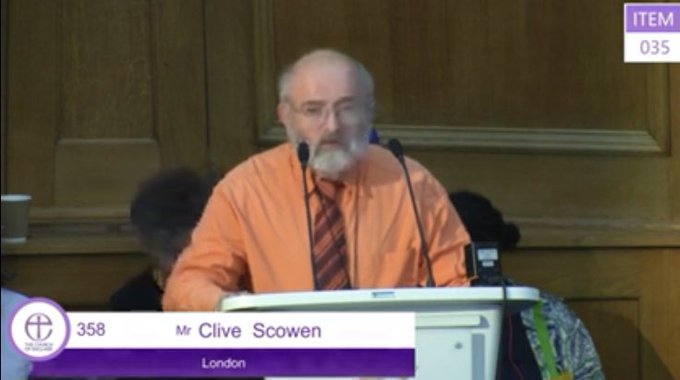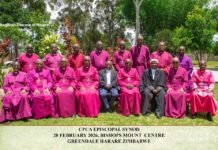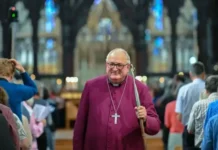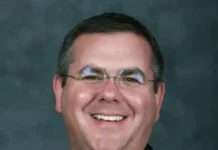For those following General Synod – here is a quick guide to the various amendments in the Living in Love and Faith debate that will be taking place on Tuesday and Wednesday.
The main motion is:
‘That this Synod, conscious that the Church is not of one mind on the issues raised by Living in Love and Faith, that we are in a period of uncertainty, and that many in the Church on all sides feel pain at this time, recognise the progress made by the House of Bishops towards implementing the motion on Living in Love and Faith passed by this Synod in February 2023, as reported in GS 2328, and encourage the House to continue its work of implementation.’
This will be introduced by the Bishop of London and it is likely that the Chair will allow a few speeches for and against the main motion as it stands before any amendments are debated.
There are 14 amendments, numbered 31-44, which can be seen on Order Paper IV. The amendments will be debated in order using the following process:
- The amendment is ‘moved’ by the named individual – they are usually given five minutes, or so, to explain why they wish to amend the main motion in this way.
- The Bishop of London will be able to respond to the amendment – indicating whether they agree with it or why they would encourage people to vote against it.
- There then follows a debate about the amendment – officially people’s speeches should be related to the amendment and not the main motion – but that isn’t always the case.
- After a number of speeches on either side the amendment is voted on. It is likely that someone will jump up and ask for a counted vote by houses – which means over 50% of bishops, 50% of clergy and 50% of laity have to vote in favour for the main motion to be changed.
- If an amendment is accepted, the appropriate change to the motion takes place at that point and Synod moves on to the next amendment. If it fails, then Synod just moves on to the next amendment.
Once all the amendments have been debated the main motion as amended is then debated. And at the end the the Bishop of London will be given the chance to respond to the debate before Synod votes on the final motion.
So, what are the amendments?
The Bishop of Durham to move the following amendment:
31 ‘Leave out “feel pain” and insert “are being deeply hurt”.’
This appears to be a linguistic change, but it should be noted that it changes the meaning from pain that is being felt by people to deep hurt that is being done to people.
This motion was accepted by the Bishop of London and passed by a show of hands.
The Ven Malcolm Chamberlain (Sheffield) to move as an amendment:
32 ‘After “at this time”, leave out “recognise the” and insert “is disappointed by the limited”.’
This appears to be an attempt to complain that not enough progress has been made by the bishops.
This motion was lost after a counted vote by houses
Bishops: In favour- 1 Against – 22 Abstentions – 13
Clergy : In favour- 78 Against – 100 Abstentions – 9
Laity: In favour- 88 Against – 104 Abstentions – 9
The Bishop of Durham to move the following amendment:
33 ‘Leave out “progress made” and insert “work and consultation undertaken”.
The meaning of this amendment will depend slightly on whether amendment 32 passes or fails – but appears to be a way of neutralising the work that the bishops have done from ‘progress’ towards the introduction of PLF to ‘work and consultation’ about PLF. If it passes it may help some people vote for the main motion.
This motion was lost after a counted vote by houses
Bishops: In favour- 11 Against – 23 Abstentions – 2
Clergy : In favour- 95 Against – 94 Abstentions – 2
Laity: In favour- 101 Against – 90 Abstentions – 6
The Revd Neil Patterson (Hereford) to move as an amendment:
34 ‘Leave out “as reported in GS 2328”.’
This allows people to vote in favour of the main motion without appearing to approve of the aspects of GS 2328, which some believe rowed back from the motion passed by General Synod in February.
This motion was lost after a counted vote by houses
Bishops: In favour- 13 Against – 20 Abstentions – 1
Clergy : In favour- 84 Against – 99 Abstentions – 6
Laity: In favour- 86 Against – 106 Abstentions – 5
Mr Clive Scowen (London) to move as an amendment:
35 ‘Leave out all words after “GS 2328,” and insert “but call on the House to take no further steps towards implementing that motion until this Synod has considered the full legal advice received by the House prior to agreeing the proposals in GS 2328.”.’
There have been many requests through Questions to persuade the House of Bishops to publish the legal advice they have received – this is another attempt to get this information into the public sphere. The House of Bishops is unlikely to vote in favour – but if the House of Clergy and the House of Laity voted in favour it might increase the pressure on the bishops to publish the advice.
This motion was lost after a counted vote by houses
Bishops: In favour- 10 Against – 22 Abstentions – 2
Clergy : In favour- 88 Against – 99 Abstentions – 0
Laity: In favour- 93 Against – 98 Abstentions – 6
The Bishop of Southwell and Nottingham to move as an amendment:
36 ‘Leave out all words after “GS 2328,” and insert “and call on the House not to commend the draft suite of prayers before this Synod has considered the complete Pastoral Guidance replacing Issues in Human Sexuality.”.’
The House of Bishops have said they will not publish the Pastoral Guidance on whether or not clergy can enter into same-sex marriages until next year. This is an attempt to slow down the introduction of the PLF and also
The Revd Vaughan Roberts (Oxford) to move as an amendment:
37 ‘Leave out all words after “GS 2328,” and insert “and call on the House not to commend the draft suite of prayers before this Synod has considered proposals for structural provision having the confidence of both those who do and those who do not seek change.”.’
The House of Bishops have not even begun to decide on proposals for structural provision – so the structural provision, which many conservatives have said that they need, will not be in place before the prayers (and possibly the standalone services) are introduced. This is both an attempt to slow down the introduction of the PLF and to ensure an even handed approach to the process.
The Bishop of Oxford to move as an amendment:
‘38 At the end insert “and ask the House to consider whether some standalone services for same-sex couples could be made available for use, possibly on a trial basis, on the timescale envisaged by the motion passed by the Synod in February 2023”.’.
This is the key amendment – and it is likely that the Bishop of London will support it. If passed it will introduce standalone services to be introduced with Synod’s support. If it fails the Archbishops could still introduce them.
The Bishop of Guilford to move as an amendment:
39 ‘At the end insert “and, in particular, to bring the “forms of service” in Annex C to GS 2328 (the suite of prayers) for approval in the same way as the “forms of service” in Annex D (the stand-alone orders).”.’
This is an attempt to ensure that both the prayers and the standalone services are not introduced without a 2/3 majority. It is a key vote for the conservatives.
The Revd Dr Sara Batts-Neal (Chelmsford) to move as an amendment:
40 ‘At the end insert “and request the House of Bishops to publish section 3 of the Pastoral Guidance, on ministry, by 31st March 2024.”.
This is an attempt to ensure that the bishops are accountable for actually producing the final parts of the Pastoral Guidance – the bishops have said they hope to have it in place by February so they may accept this amendment.
Mr Sam Margrave (Coventry) to move the following amendment:
41 ‘At the end insert “recognising all of us together are Christ’s body, and each of us is a part of it, call for the House of Bishops to make arrangements for a referendum to be held, to ask all members currently on electoral rolls within the Church of England, their views on these matters.”.’
This would be a novel approach – which goes beyond a referral to the diocese, when votes are taken in the diocesan synod.
Ms Jayne Ozanne (Oxford) to move as an amendment:
42 ‘At the end insert “, and ask the House of Bishops to consider whether sexual activity outside of marriage is a first-order creedal issue and publish that opinion.”.’
This amendment is similar to amendment 35 – the request for legal advice to be published. The question has been asked many times and no answer has been given.
Mr Sam Margrave (Coventry) to move the following amendment:
43 ‘At the end insert “and, further encourage the House of Bishops to ensure transparency and openness as further debates take place and decisions are made in relation to Living in Love and Faith.”.’
This looks like a motherhood and apple pie amendment – but still might fail because it is “unnecessary”
The Bishop of Durham to move the following amendment:
44 ‘At the end insert “and to propose firm provision that provides a clear way of distinguishing differing views and seeks to ensure that all God’s people are able to recognise those with whom they disagree (as well as those with whom they agree) as God’s gift to one another within the family of God.”.’
This is another attempt to raise the importance of ‘differentiation’ but some may think it might undermine the need for structural provision.



